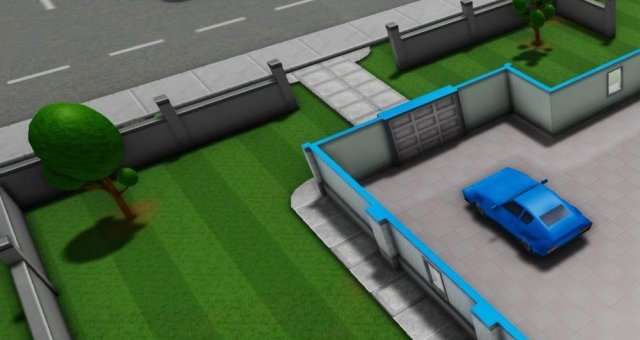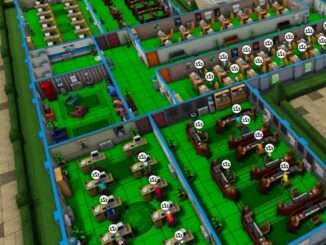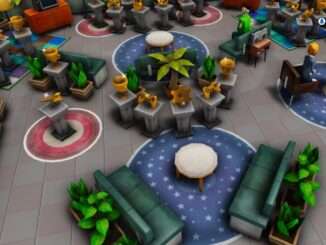
After several starts & fails, here are some tips to win on Hard Mode Guide for Mad Games Tycoon 2. I’ve made $20 mill by 1981.
Guide to Hard Mode
The Create
Company HQ – I like Australia for Skill Games. Your main’s profession is Game Designer, Star Designer, Inexhaustible, and most importantly – Error-free. Pick one more trait you like.
The Build
Create 4 (and eventually 5) rooms in the first Building:
- Bathroom (4×3).
- Lounge (4×3).
- Research (4×3).
- And when researched – Quality Assurance (4×3).
- Development (the rest of the space).
The Start
Employ 2 more people at the start that will be part of the Dev team. At the start, move everyone (me plus the other 2) to the research room, to research the hot topic at the moment and the first 2 gameplay features.
Don’t start creating a game until you have the 4 gameplay features unlocked (2 given by the game and 2 researched), otherwise your games lose money in the long run. Early Games are English only to make the games profitable.
Add more people to the dev team (I work with 5 people in the initial dev team, 1 game designer (me), 1 sound, 1 graphic, 2 programmers, all with Error-free trait. Error-free is the best trait for all employees in the Dev room.
The Game Factory
Keep developing games and as the stars improve, so will your game score.
Add 2 Researchers to the research room to research other topics that compliment the trending Genre.
Vary the games topics, but with same Genre as the trending Genre. Occasionally research topics that you think will work well with the trending Genre.
Go with developers that have a higher market base, even though they pay less (eg. $7 with 3 stars is better than $8 with 1 star) – in the long run you’ll sell more copies, and make more money.
Create paid add-ons with max content for the games that are over 10 weeks old on the market.
Create sequels when the old games go off the market.
Research Quality Assurance and build it in the first building, hire two Game Testers, then improve the gameplay on max.
For the second building, rinse and repeat the above with a 2nd Dev Unit and 2nd QA Team of 2.
No need for marketing – the publisher does that for you.
What to Research
I have 2 Researchers, and focus on keeping the Engine features up-to-date, getting all the Gameplay features, and having a variety of compatible topics to use.
Create a best-in-show Engine with the trending Genre as soon as the Genre trend changes. Stick with the trending Genre, and then change Genre once a new one starts to trend.
The Big Thing
The big thing that helps is not to go too big a game, too fast.
For example, I stuck with the Game Size ‘B’ (10 Gameplay Features) right the way through to 1981 ($20 million in the bank). The faster the games get made, the more money rolls in. Most of my game scores were 70%-90%.
The Last Idea
Once you get a 4 or 5 Star Rating with a Publisher (remember to cultivate the Publisher with the biggest Market Share), then lock-in an Exclusive Contract. You get paid more per game.





Play easy first, and use a notepad to help you out. (Or cheat and use a wiki.)
Games all have a specific “format”, related to the core type of game. You need to figure out the “perfect” values, or know them, to make top sellers. Also, some games do better naturally, in specific crowds. Selecting “ALL”, for a game that is good in every age group is NOT good or better. It’s the cheap way out. A game made for adults, even though all age groups like it, is better than the same game made for ALL. (ALL ages will still play it, but more will play it in the set age group. Otherwise just a few play in all groups. It’s like the game is so generic that no group “loves it”, when made for ALL.)
Side jobs and training, as much as possible. Have one master +50 skill, in every room. Preferably the one with the best specific attributes that help that profession. (An error free customer service is useless. That is only a trait for programming. Random error events ignore attributes.)
Release the games with errors and have another team do a free update after release, immediately. Your worst guys who do NOT have the error free trait. You don’t make bugs when fixing them. Save those guys for programming areas.
Ultimately, treat the game as a real company. Research each game after it is released to help you figure-out the direction to go for the perfect game values, if you don’t already know them. The customers tell you, “I wanted more graphics”, that tells you to alter the visuals number, not change the graphics percentage. Those percents MUST be the same as the main concept. When you find the “perfect” dev number, it shows as a green value in all future games, if you researched the game.
If your customers ask for more languages, add them in a free update. Don’t waste time and money just adding stuff to a game, on release, in hopes that someone wants that feature. Games get random demands, after release. Most things you can add, are not wanted. Don’t make a $20,000,000 game for someone who only wanted a $1,000,000 game. You don’t get more people than the market pre-determined that you will get, for each game. You will just waste time and go broke fast.
The more you throw random things out there, the less you ultimately make.
Better to focus on perfect games, while developing new ones, to experiment, and getting bonuses for trends, when possible. (Also, you can set trends, if your game is good enough. Mix odd things. One you are a master at and one that you know nothing about.)
Try programming for platforms just released, with zero games. You get 100% of that market share, being the only game made on that new platform. Do a series of sequals, on that and a popular console, to make that other console a worthy rising unit.
Thank you so much for such valuable info!